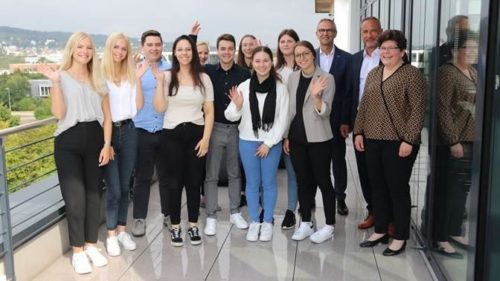New report: Europeans must take bold action to defend their sovereignty and protect their interests and values in a new age of geopolitical competition
- A new report, authored by Mark Leonard and Jeremy Shapiro, calls on EU leaders to strengthen Europe’s resilience in the face of increasing geo-political competition.
- A variety of states including Russia, China, and even at times the United States are instrumentalizing the connections of a globalised world for geopolitical and economic gain.
- The report identifies five key areas where Europeans could develop consolidated responses – including healthcare; security; digital issues; international economic policy; and climate change.
The report, Sovereign Europe, hostile world: Five agendas to protect Europe’s capacity to act, published today by the European Council on Foreign Relations (ECFR), is authored by Mark Leonard and Jeremy Shapiro.
One year after the launch of the geopolitical commission the report calls on the EU and its member states to develop European-level and national-level policies across 5 major areas, such as healthcare, security and defence, technology, international economic policy, and action on climate change – so that the EU can respond more effectively in the face of geopolitical competition from China, Russia, Turkey and other players on the world stage.
The concrete measures the report recommends include among others: protecting medical supply chains and funding European vaccines; developing a ‘collective defence mechanism’ against secondary sanctions; establishing a European security council and forward-basing; moving forward with a digital tax, and a regulatory regime for green technologies.
The report argues that the EU needs to step up to protect the international rules-based system, the transatlantic alliance, and its own spirit of openness and cooperation.
These actions would not require transferring power or decision-making to Brussels. Instead, national capitals would reclaim sovereignty that has been lost to outside players – whether it is states like Turkey and Russia or companies like Huawei and Amazon. The ECFR report, published today, sets out how this can be achieved.
The report’s authors, Mark Leonard and Jeremy Shapiro, note that the change they are proposing could present enormous challenge for the EU and its member states. However, they argue that there is appetite among citizens for a more cohesive Europe, and that European lawmakers should harness this sentiment and invest in areas that will improve the standing, and clout, of the EU in international affairs.
Commenting on the report, ECFR’s founding director, Mark Leonard, said:
“European governments are struggling to keep their citizens safe from pandemics, climate change, unemployment, and conflict. Increasingly global issues are being weaponised against them. But by working together national governments can turn the EU into their first line of defence in a dangerous world, and show a Biden administration that it can be a good partner.
This means moving beyond theoretical debates about being geopolitical or autonomous and developing an action plan to become more sovereign on health, economics, security, digital and climate policy.”
Co-author and ECFR research director, Jeremy Shapiro, added:
“The EU’s preferred option, in the face of an external threat, will always be multilateral engagement. However, this is not always viable.
In such cases, Europeans need options that will deter and push back at geopolitical hostility. The proposals that we have set out, today, aim to remedy the EU’s current vulnerabilities in this regard, and provide Europe with strong voice on the major issues, ranging from healthcare and security, through to international economic policy and climate change.”
The ECFR report calls for action across five key areas:
HEALTH SOVEREIGNTY: The EU depends on effective international cooperation to tackle its health problems, but it also competes for scarce resources and key technologies with key rivals. Multilateral institutions such as the World Health Organization and the World Trade Organization are not able to ensure effective international cooperation in their current set-up. Early in the pandemic, EU member states came to realise that despite their economic power they were not able to provide sufficient medical protection equipment in times of crisis. The EU and its member states have since made enormous strides in a relatively short time in increasing the capacity of Europe to protect its health sovereignty. However, there is more to do, if they are to develop a broader, more institutionalised, health framework for the bloc. To further this, policymakers should consider:
- Protecting the single market: The single market is arguably the EU’s greatest achievement, but the pandemic dramatically affected its capacity to function. Member states closed their borders, cut off tourism and travel within the single market, and commerce slowed down. To avoid this in the future, the EU needs a complete picture of healthcare infrastructure and dependencies across the union, common strategic stocks of health materiel, and a strengthened and expanded civil protection mechanism that can coordinate aid to member states.
- Promoting healthcare standards: Healthcare inequality across the EU meant that EU states experienced very different crises; this naturally affected solidarity. The solution within the current EU competences is to promote health standards across the union, systematise patient and personnel mobility, and promote European health standards globally.
- Protect healthcare supply chains: The EU needs to review its healthcare supply chains to determine what protection strategies it should consider adopting, including reshoring, near-shoring, diversification, and addressing chokepoint vulnerabilities. This is part of a general strategy to reduce asymmetric dependency in supply chains (see below) but will have special characteristics for the health sector. For example, the EU could aim to increase health sector resilience through private action by using regulation and incentivisation.
- Promoting and funding medical research and development: The EU and its member states need to both devote more money to medical research and development, but perhaps more importantly consider a mechanism that could quickly mobilise risk investment funds for health research and development in emergencies, similar to existing Chinese and American mechanisms.
- Coordinate a global health agenda across multilateral institutions: The Covid-19 pandemic drove home the fact that global health is only as strong as the weakest links in our systems. As a leader in global development, the EU has an opportunity to use its resources to promote an ambitious multilateral agenda aimed at helping the most vulnerable countries. In that sense, healthcare might provide an interesting model for re-energising the multilateral system at a time when it is under great pressure. The EU and its member states need to leverage their presence in various multilateral institutions to both reform their capacity to respond to emergencies and to bring them closer to European standards. Europeans can help accomplish this by forming European health caucuses within international organisations, convening global initiatives in European platforms, and seeking to unblock multilateral institutions.
ECONOMIC SOVEREIGNTY: The European Commission has long sought to reduce Europe’s dependence on other countries for critical materials and technologies – as exemplified recently by the New Industrial Strategy for Europe. However, the following steps could take this further and reduce Europe’s vulnerabilities at a manageable cost.
- Relocate and diversify supply chains. This could be achieved by exploring the economic viability of ‘on-shoring’ or ‘near-shoring’ economic activities relevant to key European sectors. The EU could also reduce its dependency on Chinese-made goods by pursuing deeper trade and investment agreements with India and the ASEAN countries. The EU-Japan free-trade agreement would be a good model to follow, according to Leonard and Shapiro.
- Enforce a level playing field in both domestic and international competition. The misuse of state aid can be countered by vigilantly monitoring international trade and investment supported by foreign governments. Direct and indirect subsidies should, if possible, be tackled in the context of the WTO. However, if this is not possible, the EU should review its competition policy instruments.
- Deter and respond to secondary sanctions. Sanctions are an important tool for ensuring European strategic sovereignty, and, if used effectively, they can increase the EU’s capacity to act. The EU should improve this valuable tool by developing an institutionalised payment channel that is insulated from the US financial system. This would allow it to act and respond independently to unilateral sanctions it disagrees with.
SECURITY SOVEREIGNTY: The EU is dangerously vulnerable to threats from China, Russia, Turkey, and other state and non-state actors – and is reliant, in large measure, on US for defence. The EU and its member states should therefore explore options that will increase the bloc’s capacity to act in the face of external threats. These options should include:
- Enhancing a European pillar in NATO. Enhancing the capability for the European nations within NATO, under that organisation’s auspices, to conduct at least one major joint operation and three smaller joint operations for crisis management with very limited US support.
- Establishing a European Security Council to enable more rapid and effective decision-making in foreign policy. Creating a body based on a subset of EU members and possibly the United Kingdom on a rotational basis that could, in close coordination with the high representative, respond to European foreign policy crises.
- Establishing European forward-basing to reassure eastern Europeans and reinforce solidarity. Establishing a Fort Charlemagne in Poland rather than the previously mooted Fort Trump or other vehicle for a US-led presence in eastern Europe.
- Stepping up solidarity operations. Expanding existing operations that bring broad European capabilities to bear on problems that are critical for specific member states, such as Estonian troop deployments in the Central African Republic, French air policing in the Baltic states, and various member state contributions to migration patrols in the eastern Mediterranean and Aegean Sea.
DIGITAL SOVEREIGNTY: Many EU member states possess world-class technology companies, well-educated work forces, and research and development capacity. But they have struggled to turn those assets into geopolitical influence. This has placed the bloc in “in the middle”, “sandwiched between the US and China”, and lacking in global influence. Given the aggressive behaviours of other countries, it is clear that Europeans now need to consider how to adapt the single market to new digital realities and to exercise its regulatory power to shape the international environment. They could do this by:
- Developing a European digital tax based on where they revenues are generated. Establishing this principle, regardless of the tax level, would allow the EU to better leverage access to its market. The EU is rightly trying to negotiate this globally first, but as von der Leyen concluded in her 2020 state of the union address “if by the end of 2020 there is still no global solution for a fair digital tax, the EU should act alone.”
- Creating an anonymised database for AI research and a regulatory framework for ethical AI. This would inspire others to emulate and encourage compliance with European ideas and provide the EU some control on this industry of the future.
- Encouraging the formation of European digital champions – particularly in emerging technologies. This would help leverage the EU’s competence in competition policy, its capacity to provide research funding, and its emerging investment protection regime to gain an advantage in some key technologies. The European Commission is already planning to invest €8 billion in supercomputing.
- Improving industrial policy and tech regulation with the Asian tech power houses. This is opportune with regards to Japan, South Korea, and Taiwan, which are also looking for greater diversification in the provision of digital goods.
CLIMATE SOVEREIGNTY: The EU is extremely vulnerable to the impact of the climate crisis. Europeans will not only suffer direct consequences in the form of extreme weather events, water shortages, and loss in biodiversity, but also the indirect consequences of increased migration to their neighbourhoods. In 2017, extreme weather events cost nearly €14 billion. This could rise to €120 billion in annual losses, with another 1C rise in temperatures. There is pressure, then, for the EU to act, and to take global leadership on reducing human-made emissions. Effective action, at a European level, could be taken by:
- Establishing a regulatory regime for clean technology. The European Commission has already proposed spending some 37 per cent of the European Recovery Fund – roughly €277 billion – on the European Green Deal. Yet, this movement towards clean energy brings both risks and opportunities. The reliance on renewable energy creates new dependencies, for example on China, which is already a leader manufacturing solar panels and electric cars. However, it also offers opportunity – off the back of Europe’s leading technology and single market – to create a regulatory regime for clean products. Such a move, partnered with the idea of a carbon border adjustment mechanism to encourage the import of less carbon-intensive goods, could enhance European influence and standardise emissions targets across the globe.
- Pairing the European Green Deal with international trade and development programmes. Since Europe produces less than 10 per cent of the earth’s greenhouse-gas emissions, the EU should look beyond its borders and consider making third-country adoption of its green policies condition of investment and trade. With relations souring between China and many of its Belt and Road partners, there is an opportunity for the EU to step in with a better offer that addresses climate change, respects its partners’ development trajectories, and allows them responsible access to Europe’s internal market.
The European Council on Foreign Relations (ECFR) is a pan-European think-tank that aims to conduct cutting-edge independent research in pursuit of a coherent, effective, and values-based European foreign policy. With a network of offices in seven European capitals, over 60 staff from more than 25 different countries and a team of associated researchers in the EU 27 member states, ECFR is uniquely placed to provide pan-European perspectives on the biggest strategic challenges and choices confronting Europeans today. ECFR is an independent charity and funded from a variety of sources. For more details, please visit: www.ecfr.eu.
The European Council on Foreign Relations does not take collective positions. This report, like all publications of the European Council on Foreign Relations, represents only the views of its authors.
European Council on Foreign Relations (ECFR)
Unter den Linden 17
10117 Berlin
Telefon: +49 (30) 32505100
http://www.ecfr.eu
![]()



